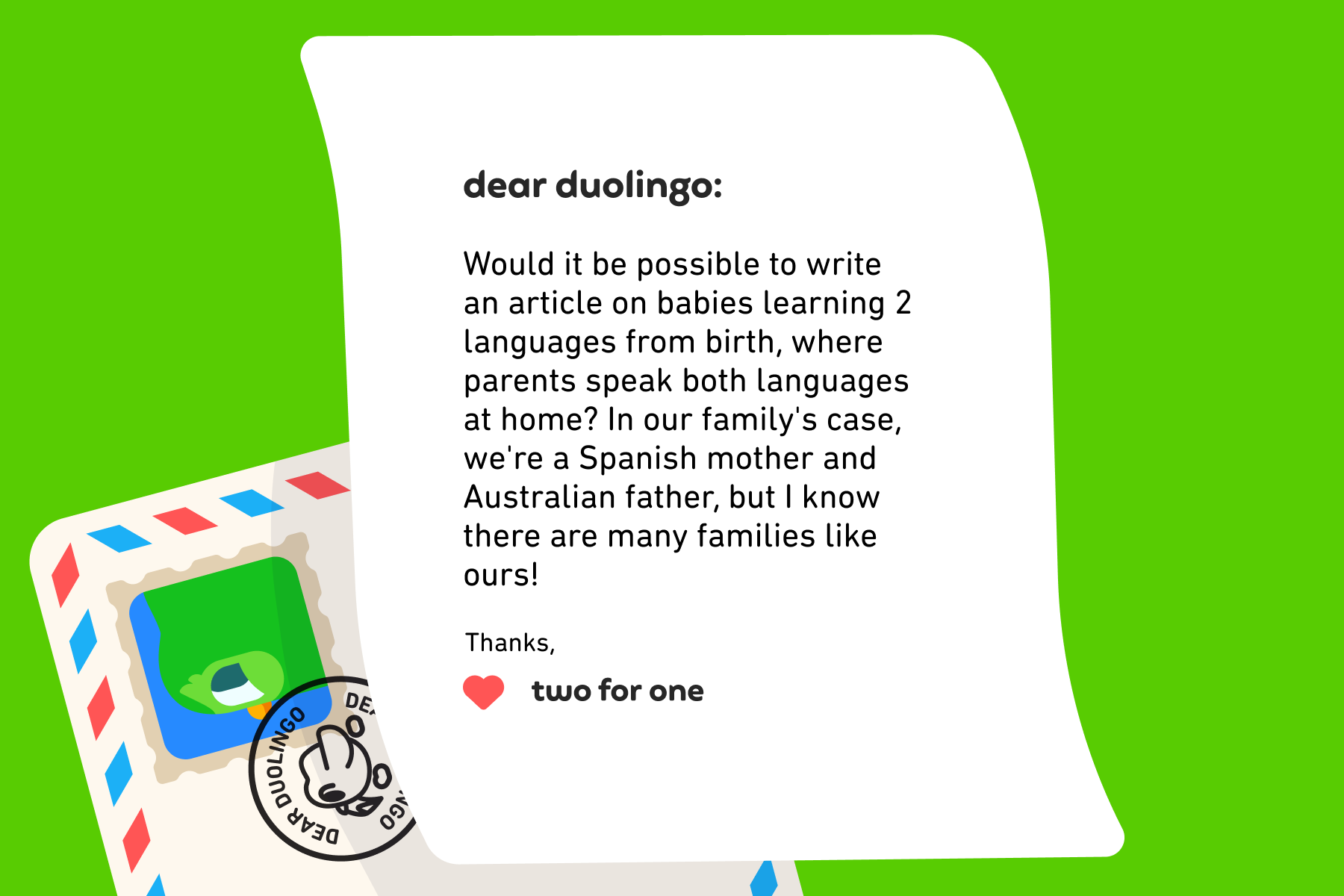Welcome to another week of Dear Duolingo, an advice column just for learners. Catch up on past installments here.
Hey there, learners! This week's question is personally meaningful—I didn't grow up bilingual, but hearing Spanish around me motivated me to not just study languages myself but to research how infants and children learn multiple languages.
This week's question:

This is an important topic because it impacts so many families around the world: those who live in multilingual communities, those living far from their language community, wealthy families and working-class families, families who speak minority languages and those who use languages with millions of speakers. And there's a lot of misinformation out there about raising kids bilingual and what to expect—even among teachers and pediatricians.
Here's what the research says:
1. Raising kids in any language is hard
Whether your family uses one language or many, raising kids is hard! Love them, keep them safe, and communicate with them any way you can—and that may or may not mean using multiple languages, or using them consistently, or using one as much as you'd like.
It's just plain hard for many families to maintain a language different from the one used outside the home—and kids are very sensitive to what is the "standard" out in the community and in their developing social network: other kids!
If using multiple languages in your family becomes stressful or induces anxiety, your kids will pick up on that and might resist. And you definitely don't want them to feel like using the language you love is a punishment or chore! Do what you can, as much as you can, and be gentle on yourself the rest of the time.
It's natural for kids to want to avoid feeling different or othered, and language is just one factor they're attentive to. That's not a reflection on parents, though—that's just socialization.
2. There isn't a single "right" way
There is no single "right" way to raise children bilingual. Sometimes people advocate for a "one parent, one language" policy, and if that works for your family and child, great—but that is not the only way or even the best way for kids to learn 2 languages. What works for one family might not work for another!
There are so many variables to consider: Do both parents speak both languages? Does the child spend more time with one caregiver? What do the parents speak to each other? What is the community language and do both parents speak it? Is the child around other multilingual kids or kids who also use the same languages? Does the child have older siblings who do (or do not) use both languages, too?
And as mentioned before, kids are perceptive. If Dad pretends not to understand English at home in order to use another language, but then uses English when out running errands with the child, the child will pick up on that, even if they aren't speaking yet themselves! Tracking people and languages is just one kind of pattern kids' brains are analyzing when it comes to language.
3. "Balanced" bilinguals are a myth
(Or they're very nearly a myth.)
There are actually many kinds of bilinguals: some who can understand multiple languages but not really speak them all, some who are literate in one but not another, some who are much more comfortable in one and sort of clumsy in another, and yes—very, very occasionally—a few who are practically equally balanced in both languages. But that legendary balanced bilingual shouldn't be the measure of success for you or your family! (And not for YOU, either, language learner.)
That's simply because of how our brains are wired and how we experience the world. It's rare for people, including children, to have equal opportunities to use, listen to, converse in, and read multiple languages. Our brains really rely on that kind of practice to build connections between words and grammar in the language, so it's very normal for some of our cognitive connections to simply be stronger than others. Importantly, this changes over time: Using only one language at home for the first years of a baby's life will build very strong connections in that language, but after starting daycare, school, swim classes, and math club in the community's language, the "dominant" language in their brain can switch! This is especially common for heritage bilinguals, who use a home language different from the community language that they are educated and spend most of their lives in.
It's also normal for kids (and grown-up bilinguals) to mix languages. The ways kids mix languages can be different from how adults do it, since they're still learning, but the principle behind babies' mixing and sophisticated codeswitching is the same: Our brains use the same systems to process all the languages we speak! Using all available resources to communicate is efficient, especially if you are just a few years old and are hearing (at least) two words for everything. (After all, if you are 3, you will probably use any word you can in order to get that treat on the counter.)
4. Incorporate reading in both languages
Literacy in both (or all!) languages is also really important to long-term language proficiency, especially when a family's home language is different from the community language. For example, if you use Spanish at home and your child learns English in school, being able to read in Spanish actually *helps* build literacy skills in English! You might see a pattern here: For multilingual people, including kids, the 2 languages don't take away from each other—they really do build on and support each other. The same is true for literacy: Children can subconsciously "transfer" their literacy skills from one language to another.
5. Avoid comparisons
Don't compare your family or child to monolinguals—or to other multilinguals.
There are unique factors that contribute to your child's overall language experience, and they can be really different even for 2 children in the same family! If you compare any 2 kids, especially from different multilingual families, there will inevitably be differences in the number of minutes per day they hear each language, how much they interact with or read each language, their emerging identities and attitudes, etc.
Even particular language patterns can differ across children. Some children may go through a "silent period," when they listen and respond to different languages but don't say anything (in any language!) themselves. Language proficiency and preferences will change over time, because there is so much change in the life of a child! Every change from newborn to daycare, preschool, kindergarten, and beyond comes with a new set of language factors and amount of exposure and interaction.
Every multilingual family is unique!
The best advice for raising a multilingual family is to celebrate all your child's languages, and all the innovative ways they use those languages! If you're interested in reading more about this research, check out this article written by two bilingualism professors who do a lot of this research themselves.
For more answers to your language and learning questions, get in touch with us by emailing dearduolingo@duolingo.com.



